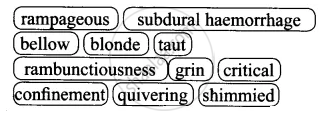Advertisements
Advertisements
Question
Match the sentences in A with their meanings in B.
| A | B |
|
You should have taken your keys. You could/might have lost your keys at the cinema. You must have left your keys at home. |
It is possible that you left your keys. You are to blame for leaving your keys. I think that you probably left your keys. |
Solution
| tou should have taken your key | you are to blame for leaving your keys |
| you could/ might have lost the key in the cinema | it is possible that youn left your key |
| you must have left your keys at home | i think that you probably left your key |
APPEARS IN
RELATED QUESTIONS

a) This is the other word for trembling
(b) This is used for smile
(c) You call a person this if he/she has pale gold coloured hair.
(d) This is a quality which relates to high energy and noise
(e) This is related to dancing or moving in a way that involves shaking your hips and shoulders
(f) This is to express a tendency to show violent and wild behaviour often causing damage
(g) We use it for a condition which is serious, uncertain and dangerous
(h) This is a state in which one is forced to stay in a closed space
(i) This is a medical condition involving bleeding in the brain
(j) It is a loud, deep shout to show anger.
(k) This is a condition when the rope or leash is stretched tightly
A large part of the story is composed of conversation between the characters.
Can you convert it into a play and in groups, present your version of the play before the class? Before that, decide onthe members of cast, minimum props required and also the costumes.
Fill in the blanks to complete the following paragraph that highlights the theme of
the poem. Use the words given in the box below.
decision sorry foresee choices pleasant direction
fork trail rewarding chance wonder both
The poem "The Road Not Taken" by Robert Frost is about the __________ that one
makes in life. It tells about a man who comes to a ___________ in the road he is
travelling upon. He feels ___________ that he can not travel___________ paths as he
must choose one. Frost uses this fork in the road to represent a point in the man's life
where he has to choose the ___________ he wishes to take in life. As he thinks about
his ___________ he looks down one path, as far as he can see trying to ___________
what life will be like if he walks that path. He then gazes at the other and decides that the
outcome of going down that path would be just as ________________. At this point he
concludes that the ________that has been less travelled on would be more
___________ when he reaches the end of it. The man then decides that he will save the
other path for another day, even though he knows that one path leads to another and
that he won't get a ___________ to go back. The man then says that he will be telling
this story with a sigh, someday in the future suggesting that he will ___________ what
life would have been like if he had chosen the more walked path even though the path
he chose has made all the difference.
The poet could not understand the words of the song, yet he raised several
possibilities about its theme. In the chart below are some of these possibilities.
Read the third stanza again, and find the phrase that matches each. Complete the
chart, by writing a phrase in each of the empty boxes. Work in pairs.

Below are certain words that appear in the story of Amelia Earhart's journey.The meanings have been given in a jumbled order. Match the words with their meanings.
| Words | Meanings |
| 1.Navigator | (a) an infection of the bowels |
| 2.Skirting | (b) a person who flies an aircraft. |
| 3.Dysentery | (c) a person who plans a route for a ship or plane |
| 4.Parachute | (d) to put something in a safe place |
| 5.Cable | (e) to leave something with no intention of returning |
| 6.Precise | (f) to go or around the edge of something |
| 7.Transmit | (g) a device that is attached to people or objects to make them fall slowly and safely. |
| 8.Implement | (h) a small boat made of rubber or plastic that is filled with air. |
| 9.Raft | (i) a set of wires, covered in plastic or rubber that carries electricity or telephone signals |
| 10.Stowed | (j) carry out |
| 11.Aviator | (k) exact |
| 12.Abandoned | (l) to send an electric signal |
Future Perfect and Future Continuous
Look at the following sentences.

Match words from the different columns to make reasonable predictions. Then write them down in the space below. One has been done as an example.

The teacher/ student will read out the Radio programme again. Fill in as much information as you can in the following table. Then exchange information with your partner to complete the table.
RADIO SHOW
| Content of programme | Details |
| 1. School News | . |
| . | |
| . | |
| . | |
| 2. Jokes | . |
| 3. 'Meet the Teacher' | . |
| . | |
| . | |
| 4. Advert Time | . |
| . | |
| . | |
| 5. Safety at School | . |
| . |
On a cold winter night you hear a loud shrieking noise at repeated intervals. What might have caused this?
Write down your ideas using the pattern below.
| it |
might could must |
have been |
the owl hooting a ghost____________ |
WRITING A MYSTERY STORY
Mysteries can be divided into several categories. There are puzzling stories, detective I crime stories, and suspense stories. They all give the reader a chance to become involved in the solution of the story through clues and character descriptions.
Characters
Before you start to write, think about the characters you might put in your story.
• What will each character do?
• Why is he or she important to the story?
• In what ways are your characters alike?
• How are they different?
• What can your characters learn from each other?
• One last thing to remember: your characters don't always have to be human. If an animal plays a part in the story, that animal is a character, too
Setting
A story has to happen in a place.
• The setting might be a place you are familiar with.
• It might even be another planet!
• A setting doesn't even have to be a real place.
Details
• Use your Imagination.
• Details help readers understand how something looks, how it feels, how it sounds - even how something smells or tastes!
Plot
• Your characters have to DO something!
• What they do is the Plot of your story.
• To make the plot exciting add Situations.
Ending
• The Ending of a story is the solution to the conflict.
• Solve the problem, dilemma or conflict faced by the main character.
• Show that your main character has changed or grown in some way.
• Tie up all the loose ends. Readers shouldn't have to choose between several hinted endings.
Complete the following information about yourself
SURVAYS ON THE USE OF COMPUTERS
| Age: | |
| Boy I Girl: | |
| Hours spent at the computer: | |
| Hours spent playing games and chatting on the internet: | |
| Hours spent surfing the Internet/ websites for learning: | |
| Hours spent per week studying at home: | |
| Hours spent for leisure activities: | |
| If you reduce your time spent on the computer, how would you spend the extra time? | |
| I like to spend my time on the computer because: |
